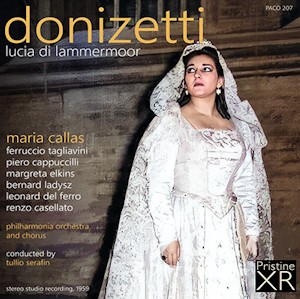
Gaetano Donizetti (1797-1848)
Lucia di Lammermoor (1835)
Lucia, Maria Callas (soprano); Edgardo, Ferruccio Tagliavini (tenor); Enrico, Piero Cappuccilli (baritone); Raimondo, Bernard Ladysz (bass)
Philharmonia Orchestra and Chorus/Tullio Serafin
rec. 16-21 March 1959, Kingsway Hall, London
Full score, vocal score and libretto with English translation available as downloads
Pristine Audio PACO207 [2 CDs: 111]
Pristine remastered Callas’ first, mono, studio recording over a decade ago; now comes the stereo remake with the same conductor but a new, then up-and-coming baritone and a supposedly veteran tenor, recorded in London rather than Florence. Pristine’s choice of cover photograph for this new release is thus rather odd, as it is of the pre-weight-loss Callas as Lucia, taken during the rehearsals at the Teatro Comunale in Florence, 1953 – whereas a picture of a slimmed-down Callas was used for the cover of that first studio recording made early that same year; it should have been the other way round.
In general, the advantages to the second recording were of course stereo sound and a deepening of Callas’ portrayal. Disadvantages include some deterioration in her vocal estate, Serafin’s regrettable persistence in maintaining the standard cuts – the second verses of some arias and the Wolf’s Crag scene – and the substitution of Ferruccio Tagliavini for Giuseppe Di Stefano. That last objection is more questionable, insofar as although it is true that signs of wear were appearing in Tagliavini’s tenor, people talk of him as if he was a veteran at the time of this recording, when he was in fact only forty-five and Di Stefano, despite being eight years younger, had also begun to decline vocally by the late 50s – although he continued to perform very well through the early 60s, too, such as in his 1961 Turandot in Vienna in 1961.
But first let us consider Pristine’s sonic refurbishment through XR Remastering. There is still a little residual hiss but the aural landscape is so much fuller, richer, cleaner and more detailed compared with the Warner release as per the Callas “Big Box” I reviewed last year; there is much more air and space around the voices, too. It is not that the Warner issues are poor – it is simply that Pristine has managed to improve markedly on something already perfectly listenable.
Turning to the voices, we can surely have no complaints about Cappuccilli’s firm, expressive singing, attractively light-toned but full of “bite”; he was still only in his early thirties and his baritone is sappy and flexible. Having said that, he is not as dramatically intense as Gobbi or Panerai – but vocally he is very satisfactory. Renzo Casellato makes an attractive Normanno and the little-recorded Polish bass Bernard Ladysz is certainly a big improvement over Raffaele Arié, Leonard del Ferro is a reedy but vibrant Arturo and a full-voiced Margareta Elkins makes a brief impact as Alisa. More importantly, there is very little about Callas’ singing here which may be termed inferior to her earlier assumption of the role. This was the same year in which she recorded her definitive La gioconda – a great recording evincing few signs of problems apart from some slight pulsing on the highest notes – and those high Ds and E-flats, and even a top E, are still there. Many moments such as the way she launches into “Soffriva nel pianto”, are heart-stopping. This is a gentler, more poignant and touching Lucia than her earlier assumptions and her coloratura in the flute duet is flawless. She uses the shorter version of the cadenza in the Mad Scene but that is dramatically more compact.
Which leaves Tagliavini. His tenor is quite lean and top notes are somewhat grainy but he is an immaculate stylist. He isn’t the ardent lover Pavarotti and the young Di Stefano portray but he doesn’t let the side down and after a dry start he becomes increasingly impassioned and vocally effulgent. After the great Act II sextet he has definitely “sung himself in” and is in fine form for the last, desperate scene. He sounds both fuller and sweeter-toned; his soft singing is meltingly beautiful yet there is plenty of heft in his top notes.
Many consider the Callas-Karajan live recording to be the best documentation of her prowess in that role. While I concede its dramatic impact and the excellence of Callas’ co-singers, its sound is for some a barrier to enjoyment, especially now that we may hear this second studio recording in this new incarnation. Despite my love for, and admiration of, Callas’ recorded performances of Lucia, I have always considered the Bonynge-Sutherland-Pavarotti-Milnes-Ghiaurov recording superlative and best all round, hence I designated it one of the “Untouchables” in my survey – but of course these things are subjective and I would certainly never want to be without Callas in one of her seminal roles, even if her co-singers are not on quite the same level as Sutherland’s.
Ralph Moore
Previous review: Göran Forsling (January 2024)
Availability: Pristine ClassicalOther cast
Arturo: Leonard del Ferro (tenor); Alisa: Margareta Elkins (mezzo-soprano); Normanno: Renzo Casellato (tenor)


















